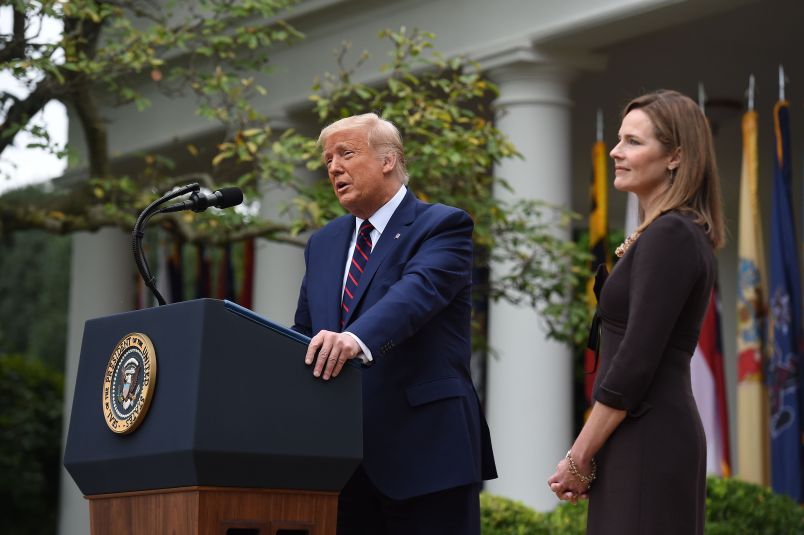President Donald Trump on Saturday formally nominated Judge Amy Coney Barrett to fill the seat of the late Justice Ruth Bader Ginsburg in a move that if confirmed will significantly tilt the ideological bearings of the Supreme Court for years to come.
“She is a woman of unparalleled achievement, towering intellect, sterling credentials and unyielding loyalty to the Constitution,” Trump said.
“I looked and I studied, and you are very eminently qualified,” Trump added of Barrett as she stood beside him in the Rose Garden.
Barrett, a favorite among right-wing activists and religious conservatives for her views on abortion and health care, will likely be an ideological opposite to the late Justice Ruth Bader Ginsburg she is poised to replace.
An ideological heir to the late conservative Justice Antonin Scalia, for whom she clerked in the 1990s, Barrett noted the friendship between the late Ginsburg and Scalia in remarks on Saturday, adding of her mentor: “His judicial philosophy is mine, too.”
Barrett is the third Trump nomination for the hight court, following previous nominations for Justices Neil Gorsuch and Brett Kavanaugh.
Trump previously nominated Barrett in 2017 to the U.S. Court of Appeals for the Seventh Circuit in Chicago. At that time, she faced tough questioning about whether her religious convictions would influence her legal decisions.
Sen. Dianne Feinstein (D-CA), grilling Barrett at that time, said that “the dogma lives loudly within you, and that’s of concern.”
A mother of seven and a devoted Roman Catholic, Barrett will likely face rigorous questioning amid her confirmation in the coming weeks about whether she will be able or willing to resist the expectations of her church when it comes to rendering her judgment on the high court.
Barrett would also be the only justice on the current court not to have received her law degree from an Ivy League school. The eight current justices all attended either Harvard or Yale.
The president had previously interviewed Barrett in 2018 for the vacancy created by the retirement of Justice Anthony Kennedy, but Trump ultimately chose Brett Kavanaugh.
If confirmed, Barrett will be the sixth justice of Catholic faith on the Supreme Court’s nine-seat bench. Other notable Catholics who serve on the high court include the liberal Sonia Sotomayor and the staunchly conservative Clarence Thomas.
There has been a majority of Catholic justices on the Supreme Court since Alito joined in 2006. Until that time, the Supreme Court for most its its history had been almost entirely populated by white male Protestants.
Trump and his political allies are itching for another fight over Barrett’s faith, seeing it as a political windfall that would backfire on Democrats. Catholic voters in Pennsylvania, in particular, are viewed as a pivotal demographic in the swing state that Biden, also Catholic, is trying to recapture.
While Democrats appear powerless to stop Barrett’s confirmation in the GOP-controlled Senate, they are seeking to use the process to weaken Trump’s reelection chances.
Barrett’s nomination could become a reckoning over abortion, an issue that has divided many Americans so bitterly for almost half a century. The idea of overturning or gutting Roe v. Wade, the landmark 1973 decision that legalized abortion, has animated activists in both parties for decades. Now, with the seemingly decisive shift in the court’s ideological makeup, Democrats hope their voters will turn out in droves because of their frustration with the Barrett pick.
Trump has also increasingly embraced the high court — which he will have had an outsized hand in reshaping -– as an insurance policy in a close election.
Increases in mail, absentee and early voting brought about by the coronavirus pandemic have already led to a flurry of election litigation, and both Trump and Biden have assembled armies of lawyers to continue the fight once vote-counting begins. Trump has been open about tying his push to name a third justice to the court to a potentially drawn-out court fight to determine who will be sworn in on Jan. 20, 2021.
“I think this will end up in the Supreme Court,” Trump said Wednesday of the election, adding, “And I think it’s very important that we have nine justices.”
Meanwhile, outside conservative groups are planning to spend more than $25 million to support Trump and his nominee. The Judicial Crisis Network has organized a coalition that includes American First Policies, the Susan B. Anthony List, the Club for Growth and the group Catholic Vote to help confirm Barrett, and Trump’s campaign is expected to include the nomination in upcoming advertising.



